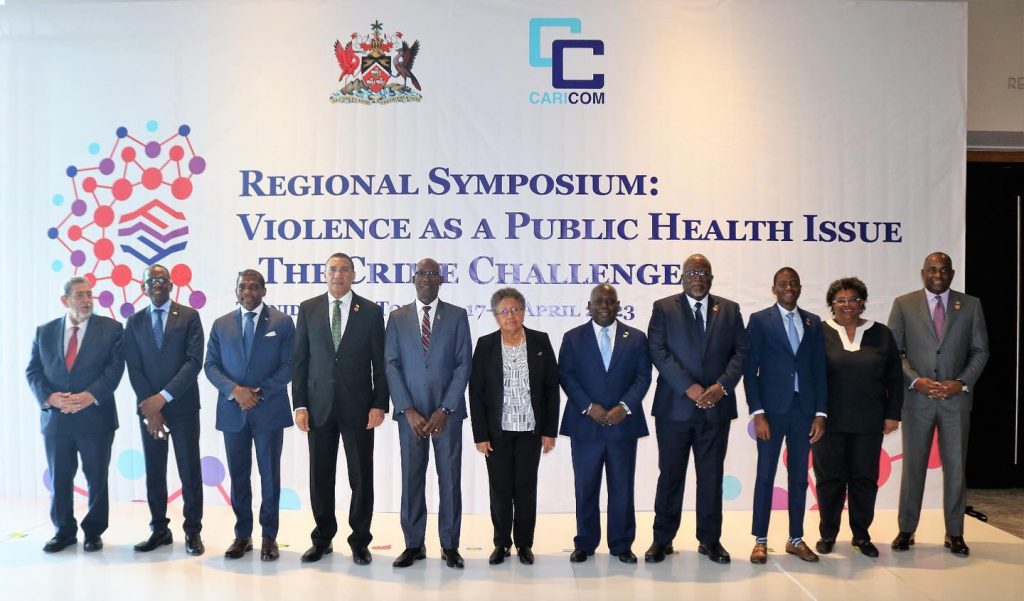
Declaring crime and violence as a public health issue in the Caribbean, regional Heads of Government have agreed to strengthen the development of security as a fourth pillar of CARICOM.
The CARICOM leaders also plan to work together to comprehensively overhaul the criminal justice systems within CARICOM to address criminal terrorists with a focus on proactive management of prosecutions, sentencing and the diversion of at risk young people.
The CARICOM Heads of Government issued the Declaration last evening at the conclusion of a two-day Regional Symposium on Crime and Violence, in Trinidad and Tobago.
The regional leaders, including Guyana’s Prime Minister Mark Phillips, said the epidemic of crime and violence in the Caribbean, fuelled by illegal guns and organized criminal gangs, remains a threat to democracy and the stability of societies within the region.
The high rate of illegal exportation of guns from the United States to the Caribbean Region is also a major concern, the leaders said.
In the past, the Caribbean region embraced the United States in its ‘War on Drugs’, and the Region, in observing that gun has become the new drug, wants the US to reciprocate and join the Caribbean in its ‘War on Guns’.
The impact of crime and violence on social, economic and health systems across the region remains grave, and the leaders have vowed to do more to address the epidemic.
CARICOM Secretary General, Dr Carla Barnett, bemoaned the need for a comprehensive approach.
“Heads of Government and distinguished delegates, ladies and gentlemen, violence in our Region is an epidemic, and like any epidemic, effective strategies to combat the spread require data and research, as well as human and financial resources to allow timely implementation of solutions to address the root causes of crime and mitigate the devastating impact of crime and violence on our societies,” the CARICOM Secretary-General reasoned.
The regional leaders are convinced that the multi-faceted nature of violent crime and its pervasive effects require a robust regional response that includes a public health approach that takes into account all sections of society.
In his address, Prime Minister of St. Kitts and Nevis, Dr Terrance Drew said an evidence-based approach is needed to tackle the issue, which continues to have a devastating impact on the region.
The evidence, he said, is well documented.

“My information is that public health and security experts can produce maps of violence hotspots. They know the demographics and geographics of clusters. There are graphs of incidence versus time which depict a series of Epidemiological Curves. Therefore, the violence challenge in the Caribbean appears to be well-characterized as a public health issue with ominous social and economic implications. Neither good health nor development are possible in a climate of violence,” Prime Minister Drew said.
He said it is imperative for the CARICOM Member States to apply best-practices in their approach, such as the interventions articulated by WHO Official Dr Gary Slutkin.
“I regard this regional symposium as a coalition of the willing. Notwithstanding the delays, there is a window of opportunity to move the needle to solutions. Our people must see and feel solutions, now. I came convinced and I want to leave seize with a commitment to train people with street credibility to function as violence interrupters,” he said.
The CARICOM Heads of Government have also agreed to strengthen regional forensic capabilities and collaboration among national forensic agencies.
They have also agreed to prepare regional model legislation to bring greater harmonization and efficiency to the development and revision of national laws, and to ensure the immediate and effective implementation of the CARICOM Arrest Warrant Treaty.



















You must be logged in to post a comment Login